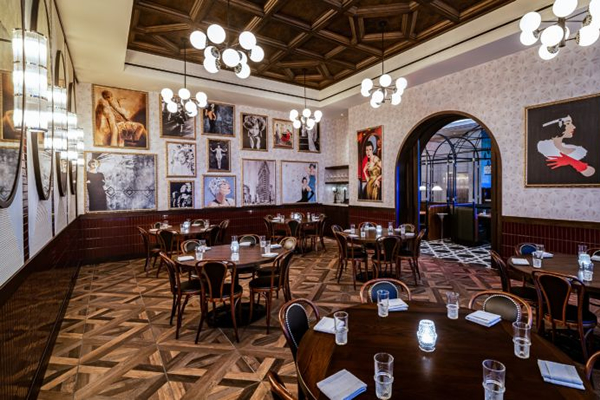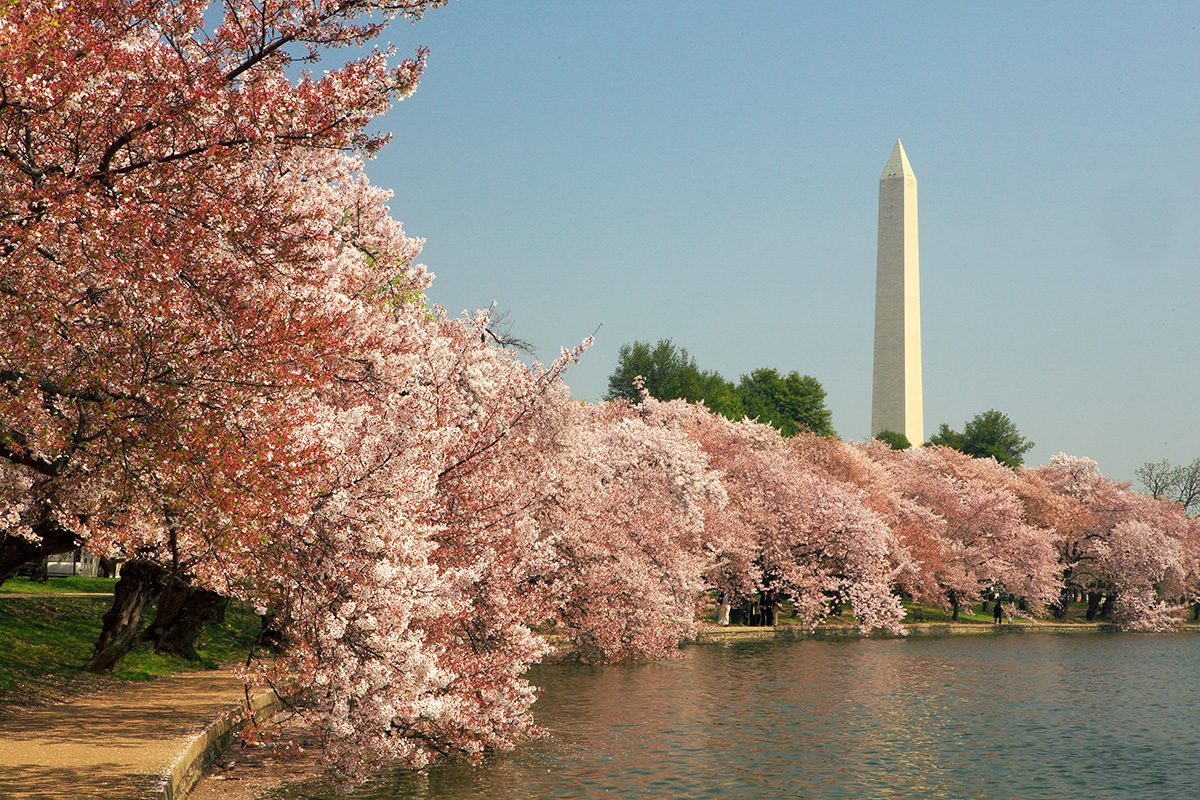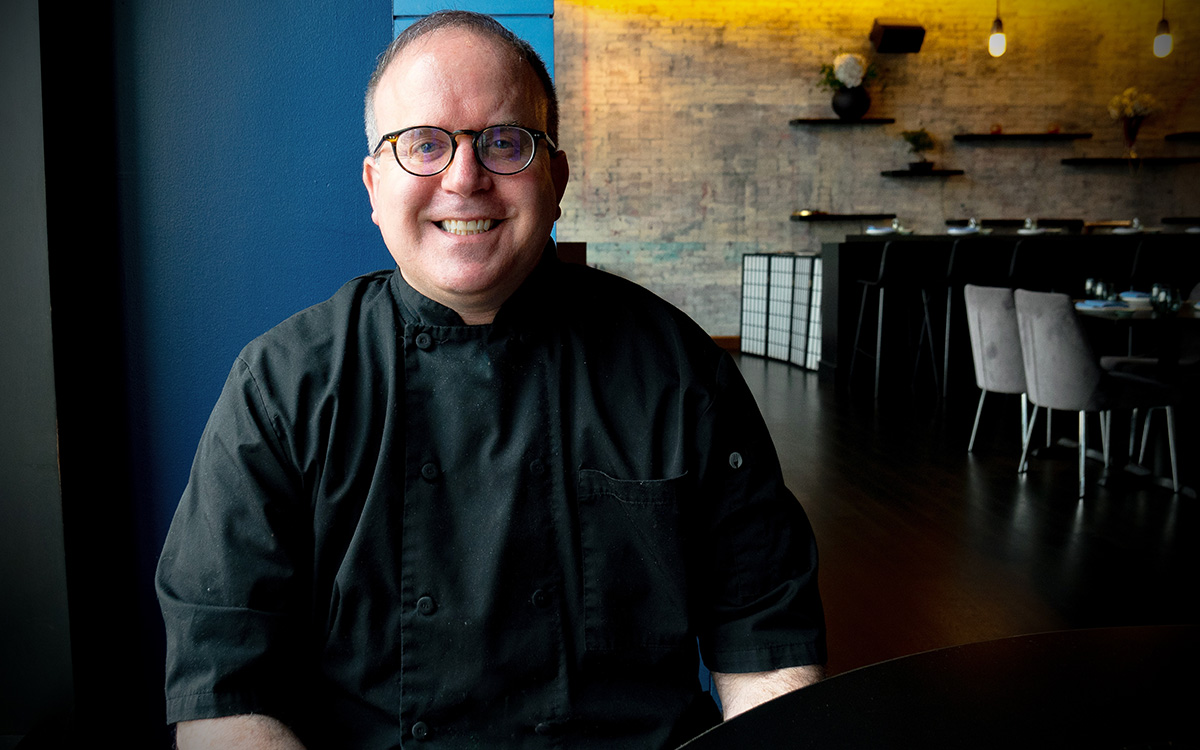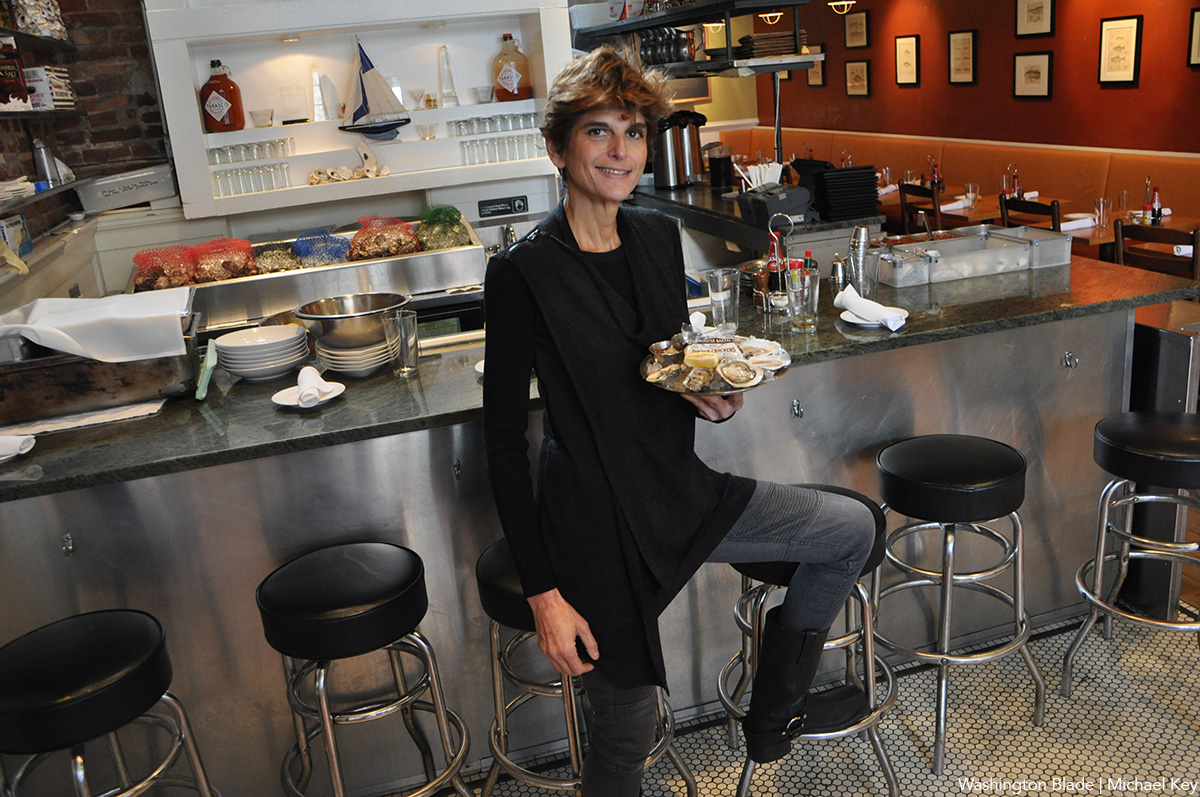Dining
After pandemic, local gay restaurateurs thriving at Knead
Berry, Reginbogin plan to open several new spots in coming year

At the outset of 2020, D.C.-based Knead Hospitality + Design founders and co-owners (and partners for more than 20 years) Jason Berry and Michael Reginbogin envisioned big plans for their rapidly expanding realm of restaurants across the D.C. area.
“In March 2020, however, we thought that we were going to lose everything,” Reginbogin says.
Today, Knead has recovered, and then some. In the context of the sweep of more than 100 restaurant closings in D.C. since then, Berry and Reginbogin pulled out four restaurant openings, with several more planned for the rest of this year alone.
Not since the (somewhat slower) growth of Jose Andres’ ThinkFoodGroup has the city seen a locally based firm with a diverse set of concepts open so widely. Andres launched the first Jaleo back in 1993; his ThinkFoodGroup now runs 10 restaurants in D.C., plus stalls at Audi Field.
Yet Berry and Reginbogin promise that it’s not size that counts. “Biggest isn’t always best. We want to be the best operator in the city for the types of restaurants we offer.”
This spring’s opening of glitzy-retro diner Gatsby speaks directly to Reginbogin’s vision for that “our restaurants are experience-driven. They focus on the visual as much as the food and beverage offerings.”
Gatsby, located in Navy Yard, is a direct outgrowth of Berry’s belief that “like the Roaring ‘20s after the Spanish flu, there’s all this pent-up demand…. People will want to celebrate life, and they want to be part of that return to society,” he says.
In 2014, Berry served as COO for the Rosa Mexicano Restaurants, and Reginbogin had been working as director of operations for other large brands like B.R. Guest Restaurants, TAO, Milos, and Sushi Samba. After living in cities like Los Angeles and New York, they decamped for Washington, D.C., a city they’d visited dozens of times for work, with an idea of creating their own style of dining experience.
Both having attended the University of Southern California, the two met on AOL in their early 20s and started dating soon after. They have worked in the restaurant industry for their entire careers.
“D.C. is a beautiful, diverse city,” says Reginbogin, “but of all the cities we had lived in, we felt there was the most opportunity in D.C. The growth of the restaurant industry has been because of a welcoming regulatory environment as well as a city of quality, unique, and amazing restaurants. We want to surround ourselves with peers who are of the same philosophy.”
He says that they felt at home, welcomed “both professionally but also personally.” To further connect them with the LGBTQ community, the pair ensured that they were prepared for Pride month, setting up drink and food specials at their restaurants, with proceeds going to LGBTQ organizations.
“There was always the question of being able to both live and work with your partner,” Berry notes, “but because we excel at different areas, it works out. Our background in the restaurant industry gives us the perspective on how the restaurant should be constructed.”
When Berry and Reginbogin plan each new concept, they first analyze its urban and social geography. By understanding the restaurant’s space, interior and exterior, they put together a concept and then a menu (often along with a celebrity chef) to follow. But they also target specific parts of town.
“We tend to favor neighborhoods that are not reliant on one demographic for attracting a guest base,” says Reginbogin. “We tend to open where we can establish roots…. The pandemic taught everyone that it’s easy to lose a prized group of guests. You don’t want that one type to be the only guest you attract.”
This outlook led them to Navy Yard, the Wharf, and Penn Quarter, among other neighborhoods.
When they kicked off in 2015, opening Succotash in National Harbor, they invested some of their own capital, raised money from friends and family, and took on loan debt. “Our newer big restaurants are roughly $6-7 million projects. We are also opening smaller restaurants that cost significantly less, in the $2 million range,” said Reginbogin.
As of June, Knead operates five other concepts: Succotash, Mi Vida, The Grill, Gatsby, and Mah-Ze-Dahr, which abuts Gatsby and is run by baker Umber Ahmad, a 2019 James Beard semifinalist. They also run four quick-service stands inside Swingers, the massive adults-only minigolf concept out of London that just opened in Dupont Circle. Berry promises there is more to come in 2022 and beyond.
Knead’s other planned openings this year include Bistro du Jour, Mi Casa, another Succotash location in Penn Quarter, and another Mah-Ze-Dahr by the new Amazon HQ.
Back to Gatsby, the glam atmosphere showcases the group’s focus on space and design as much as menu. As the location is across from Nationals Stadium, the two envisioned an all-American restaurant. Yet the interior and atmosphere did not express to them a stereotypical diner with an Airstream and laminate-covered booths. Instead, the two visualized the swinging, Art Deco style of the 1920s when diners started to become popular. As it translates to plating, this means the overflowing bowl of pasta that might appear on a multi-page diner menu is lightened and elegantly served; the Caesar salad is vegan. No detail is spared, from soaring ceilings and retro prints to translucent silver plates with textured patterns.
“We want people to eat with their eyes,” Berry concludes. “Everything is important: the lighting, music, tableware, even the restrooms. If everything looks good and feels good, then everything tastes better, too.”
Dining
New D.C. restaurants opening just in time for spring
Mexican fare, burgers, fancy cocktails, and more on tap

Shaking off winter slumber, the D.C. dining scene this spring is gathering steam. Just a taste of the openings and happenings are below:
Already Open
Pascual (732 Maryland Ave., N.E.): This modern Mexican restaurant is helmed by chefs Isabel Coss and Matt Conroy of Lutèce, and run by The Popal Group (which also owns Lapop and Lapis). Pascual gets its name from the patron saint of cooks and kitchens. The menu, which rests on fire-grilled dishes, is inspired by Coss’s Mexico City roots, and both chefs’ past work at top Mexican restaurants. Pascual plans to add a daytime bakery and coffee shop called Volcán.
Moon Rabbit (927 F St., N.W.): Chef Kevin Tien abruptly closed his Moon Rabbit restaurant on the Wharf a year ago during union negotiations by staff of the Intercontinental Hotel, where the restaurant was located. This reopening represents a welcome comeback of this fine-dining Vietnamese restaurant. The restaurant concept will be the same, but will have new dishes for the new space.
Joia Burger (3213 Mt. Pleasant St., N.W.): It’s smash patties and French fries that make up the entire menu of this fun-filled carryout spot. Run by Purple Patch chef/owner Patrice Cleary, she brings burgers (including veggie burgers) in a family-friendly and homey atmosphere, as well as vibrant ube soft serve as a nod to her Filipino heritage.
Coming soon
Press Club (1506 19th St., N.W.) is an intriguing new spot from industry old-timers including Will Patton (from Bresca and Jônt). Located in Dupont Circle, it will be a new bar and cocktail lounge based on the format of records (i.e. sides A and B). The a la carte “Track List” menu is a cocktail menu that rotates biannually featuring the team’s favorite spirits and techniques. The curated “Play List” menu is a bi-monthly rotating cocktail flights highlighting more seasonal ingredients, presented tableside with supplemental bites. The cocktails will draw inspiration from songs loved by the founders and are arranged to resemble the flow of a record.
Immigrant Food (4245 N. Fairfax Dr.): The restaurant group combining global dishes and advocacy is set to open a new spot in Ballston. Immigrant Food has three locations already: the Planet Word Museum, by the White House and in Union Market. The restaurant will feature both indoor and outdoor dining areas by the Ballston Metro.
Bar Japonais (1520 14th St., N.W.): This restaurant is still forthcoming in the former Estadio space, set for later this spring. It will be a take on its sister restaurant Bar Chinois in Mount Vernon Square. Bar Japonais will bring together French and Japanese influences. Developed in the izakaya style, the restaurant will have Japanese-leaning food and French-leaning cocktails, and has weekly events in the works.
Dogon, at Salamander Hotel (1330 Maryland Ave., S.W.), is a highly anticipated opening from celebrity chef Kwame Onwauchi. The opening represents his return to D.C. with a concept inspired by D.C. Surveyor Benjamin Banneker and Onwauchi’s heritage to the West African Dogon tribe. Pronounced “Doh-gon,” the restaurant will serve vibrant cuisine through an Afro-Caribbean lens and draw from Onwuachi’s unique Nigerian, Jamaican, Trinidadian, and Creole background.
Alfreda (2016 P St., N.W.): A pizzeria in Dupont Circle, named for the chef’s grandmother. The pizzas – made on a sourdough crust and including gluten-free options – are based on more traditional techniques, but using global flavors. The menu also includes salads, small plates, and a long wine list.
Beresovsky’s Deli: Gay-owned KNEAD Hospitality + Design is teasing a deli later this year. It will be located inside the preexisting Mah-Ze-Dahr Navy Yard location.
Events
The Restaurant Association Metropolitan Washington (RAMW), is expanding from its winter and summer Restaurant Weeks to give diners another opportunity to celebrate the change of seasons with Spring Wine Fling. Spring Wine Fling is a platform for local eateries to highlight their wine programs with creative pairings. Participating locations will showcase their wine programs through curated wines paired with two-course prefix $55 menu offered during dinner service.
National Cherry Blossom Festival: RAMW is also working with the National Cherry Blossom Festival. The National Park Service has anticipated peak bloom dates for 2024 between March 23–26. The festival has developed a full list (called “cherry picks”) of where to eat as part of the celebration. Many restaurants, bars, and hotels have also set up activations and events across the city.
Dining
Pastry chef Alex Levin creates desserts with global influences
And now he’s on a quest to bake the perfect chocolate chip cookie

A decade as a decorated pastry chef in Washington, D.C., and Alex Levin knows how to create a global realm of desserts. But he also knows that the whole is tastier than the sum of its parts.
Levin serves as Executive Pastry Chef and as part of the executive team for Schlow Restaurant Group, where he’s worked since 2017. He’s crafted desserts for the group’s breadth of restaurant cuisines, from Spanish at Tico (recently rebranded as Japanese Nama Ko), American at now-closed Riggsby, Japanese at Nama and Nama Ko, and Italian at the several Alta Strada spots. He also throws an annual sold-out bakery pop-up for Thanksgiving and for Rosh Hashanah, the Jewish New Year. “There’s something fun and so meaningful to spend nine straight days making food that will be a part of so many people’s celebrations,” he says.
Yet as a gay man, he also strives for representation and a focus on supporting the LGBTQ community.
After graduating from Yale and focusing on a career in management and finance, Levin fled that industry to attend the Culinary Institute of America to follow his passion for pastry and restaurant management. After graduation, he trained at restaurants like Jean Georges and Cafe Boulud in New York, and moved to D.C. in 2013 to open Osteria Morini as pastry chef. There, he made a name for himself, earning a spot on Eater’s Young Guns in 2015 and in 2016, he earned the title of Best Pastry Chef from the Restaurant Association Metropolitan Washington.
It was a time of invention in the dessert space. Levin was deeply embedded in some of that boundary-stretching.
“When I first became a pastry chef, all of my mentors were pushing me to create deconstructed desserts. I really fell in love with that approach, because it challenged me to think very far outside of the box to have a guest really understand that a plate with five components on it could be considered a lemon tart.”
Yet at Schlow, running dessert programs across the city for an increasingly demanding clientele, his approach evolved. The deconstructed version might look more beautiful, but he realized that it also has to taste even better than its classic counterpart.
“I realized that sometimes there is no reason to alter a classic dessert but to add perhaps a modern shift. That’s where I feel most comfortable now. It allows me to continue to express creativity both visually and with flavor to create the best version of a classic dessert.”
At Alta Strada (which has landed in the Washington Post’s Dining Guide for several years), Levin leans in to the restaurant’s homey style, with a touch of his signature flair, in the several desserts he makes. Traditional bomboloni get a glow up, given depth and tang with ricotta, vanilla, and orange in the batter and receiving a liberal dusting of cinnamon sugar; they’re served on a platter with chocolate hazelnut crema (i.e. liquid Nutella). He also crafts a brownie-cheesecake mashup: a whipped ricotta (sense a theme?) cheesecake sits atop a rich brownie, the black-and-white dessert set off by a single Luxardo cherry on top.
At Nama Ko, Levin’s menu is more concise but takes some additional liberties. The star is the Miso Honey Black Truffle soft serve ice cream, drizzled in chocolate sauce and caramel, under a shower of chocolate and toffee (there’s also a passionfruit sorbet with ube shortbread crumble). Now an expert at adjusting his soft serve machine to the right ratio of sugar, dairy, and flavor, Levin matches the sushi restaurant’s entrees with the ice cream’s balanced umami. Speaking of matching: he also plates a matcha crème brulee.
“When planning the dessert program for Nama Ko, I wanted to do something totally different for dessert — something the restaurant could be known for all on its own. The program had to be fun and allow the guests to have a Japanese dessert but with a twist. Once we landed on soft serve, the proposed flavors needed to have a level of simplicity and complexity.” The rollout received accolades, including in Washington City Paper and Eater’s Soft Serve map.
Levin, though, also serves as director of Strategic Business Initiatives. He coordinates operations, recruiting, reporting, marketing, menu design, and photography. He is constantly rethinking: refining his rotating selection of chocolate bonbons for special events, using colored cocoa butter for visual effect. He stays up on cookbooks, YouTube, and Instagram as resources for explanations and demos, “even how to braid a challah dough using a new technique.”
After coming out in 2000, Levin says he never encountered much homophobia in the culinary industry. In D.C., he works to support LGBTQ groups, personally and through his restaurants. “That might mean making Thanksgiving desserts for SMYAL’s annual Thanksgiving dinner for the kids, or even transforming one of our restaurants into a destination for D.C.’s annual Pride.” Levin also picks up a shift at the special seated dinner tables at the annual Chefs for Equality event, one the largest (and most fabulous) fundraisers for Human Rights Campaign.
Levin won’t rest on his soft serve laurels, continuing to find creative space. Stay tuned to his latest project, going on three years: to create “the best chocolate chip cookie. The current version is pretty close, but I continue to make some small modifications to improve the outcome.”
Dining
D.C.’s Restaurant Week is back with expanded pricing structure
‘More dining options to customers at a variety of price points’

The wintertime culinary highlight is back: Restaurant Association of Metropolitan Washington (RAMW) Winter Restaurant Week returns Monday, Jan. 15, through Sunday, Jan. 21.
The big news: Restaurant Week is expanding its pricing structure. Participating restaurants can offer multi-course brunch (including on Jan. 15, in honor of Martin Luther King Jr. Day) and lunch menus for $25 or $35 per person. Dinner menus now run for $40, $55, or $65 per person. And again, many restaurants will also offer cocktail and wine (and non-alcoholic) pairings, giving diners various ways to drink (or not) along with their meals.
RAMW President & CEO Shawn Townsend said that the new “menu prices have been added to the promotion to allow more restaurants to participate and have these participants offer more dining options to customers at a variety of price points that fit every budget.”
More than 250 restaurants across the city, Maryland, and Northern Virginia are participating this year.
A non-comprehensive list of new restaurants:
• Latin-inspired Flora at luxe Wharf hotel Pendry
• Modern Malaysian restaurant Makan in Columbia Heights
• Mita in Shaw, a showstopping vegetarian restaurant that opened less than a month ago
• Ceibo in Adams Morgan, a unique Uruguayan restaurant that opened in October
• Code Red in Adams Morgan, a halfway hidden mood-lit speakeasy-style spot
• Mercy Me at Yours Truly Hotel, which just debuted a new menu
• Little Black Bird, a cozy wine bar
• Michelin-starred Xiquet DL in Woodley Park, where the everyday tasting menu runs a cool $265
• Big-name celebrity chef Jose Andres’ blockbuster new restaurant The Bazaar.
In NoVa, there are also a few first-timers, including Ingle Korean Steakhouse, Sabores, and Makers Union; first-time Maryland participants include Charley Prime Foods in Gaithersburg and several Milk and Honey locations.
RAMW is highlighting the H Street, N.E., neighborhood (which this author noted is struggling in his 2023 D.C. Dining Year in Review) through the participation of an overflowing handful of new (Ethiopic, Granville Moore’s, Irregardless, Paste & Rind, Pow Pow, The Queen Vic, Sospeso, and Sticky Rice) and returning (Mozzeria, Maketto, Stable, and Sticky Fingers Diner) spots. In fact, H Street is home to the only two vegan restaurants participating, Sticky Fingers and Pow Pow.
To support LGBTQ-run restaurants, diners could visit Hank’s Oyster Bar (Dupont Circle and on the Wharf), owned by Jamie Leeds. Gay-owned KNEAD Hospitality + Design is involving its restaurants in the promotion. The group’s restaurants include Gatsby, Mi Vida, The Grill, and more.
The “RW-To-Go dinner meals,” a program popular during the pandemic, has ended. As Restaurant Week was originally created for people to dine-in, “we would love for people to get out and enjoy meals in restaurants,” said an RAMW representative.
Some spots are offering additional deals, extended timelines, and other options. For example, Buena Vida Gastrolounge and Ambar are extending promotions through Jan. 28.
Winter Restaurant Week is also offering a Diner Rewards Program. Participants are entered into prizes for each Washington Restaurant Week cycle, including gift cards, cookbooks, and event tickets.
“Restaurant week is important because it brings people together, boosts the economy, and puts a spotlight on all of the wonderful restaurants in the region,” says Townsend.
The Washington Blade held a short interview with two restaurateurs: one returning, and one new (responses have been edited for space and clarity).
Returning restaurant: Trummer’s. Responses by Stefan Trummer, owner.
BLADE: Why is your restaurant participating in Winter Restaurant Week?
TRUMMER: We are excited to offer our guests a fun menu to encourage diners to try both our lunch and dinner experience. We haven’t participated in RW since before COVID and it feels right to get back on track with this promotion.
BLADE: What do you like about the promotion?
TRUMMER: Restaurant Week often attracts new guests to the restaurant. It gives us a chance to meet some new diners and offer our menus to a wider audience.
BLADE: Tell us something unique and specific about your restaurant
TRUMMER: Trummer’s is a modern bistro in a beautiful historic building and town. Each room of the restaurant offers different experiences from the bar with specialty cocktails and a massive whiskey list to the Winter Garden with bright airy dining or the Wine Room with a large picture window looking into our expansive wine cellar.
New restaurant: Fireclay. Responses by Frank Gray, executive chef at the Hotel Washington.
BLADE: Why is your restaurant participating in Winter Restaurant Week?
GRAY: Fireclay at Hotel Washington is a newcomer to the downtown D.C. gastronomy. It is joining the rooftop bar, Vue at the Hotel Washington. (Formerly POV at W Hotel). This is Fireclay’s inaugural Restaurant Week and we want to showcase all it has to offer.
BLADE: What do you like about the promotion?
GRAY: It gives newcomers such as Fireclay extra exposure in the D.C. market alongside some of the best restaurants in D.C.
BLADE: Tell us something unique and specific about your restaurant?
GRAY: It is a “kissed by fire” food and beverage concept. All dishes and drinks have a component of smokiness and the majority of dishes are finished in wood burning Argentine-style ovens.
-

 State Department4 days ago
State Department4 days agoState Department releases annual human rights report
-

 District of Columbia2 days ago
District of Columbia2 days agoCatching up with the asexuals and aromantics of D.C.
-

 South America2 days ago
South America2 days agoArgentina government dismisses transgender public sector employees
-

 Maine3 days ago
Maine3 days agoMaine governor signs transgender, abortion sanctuary bill into law












